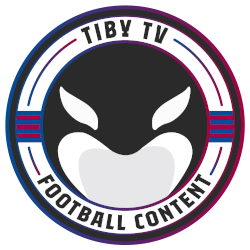FC Barcelona’s iconic sponsorless jersey has always meant more than just football.
For almost 107 years, it stood as a symbol of pride, tradition, and a philosophy that put values over commercial gain.
So why didn’t Barça have a sponsor on their jersey before 2006, when almost every big club had one by the 80s or 90s?
That’s why I am here today…To break down the story and the history behind that iconic Blaugrana blank kit.
TRADITION OVER PROFIT
Unlike most top clubs, FC Barcelona held onto a strong identity that rejected the commercialization of their kit.
For many years, the club operated on a model deeply rooted in Catalan pride and member ownership, often referred to as “Mes que un club”, which translates to “More than a club”.
While teams across Europe got covered with corporate logos on their shirts for extra cash, Barça said no.
Not because they couldn’t use the money, but because they didn’t want to change what the jersey stood for.
And they held out longer than anyone.
UNICEF IN 2006
In 2006, for the first time ever, something appeared on the front of Barça’s jersey: UNICEF.
But here’s the twist, my friend…
IT WASN’T A SPONSORSHIP DEAL.
Instead of UNICEF paying the club, it was the other way around.
FC Barcelona actually paid UNICEF around €1.5 million per year to support global children’s programs.
It was framed as a humanitarian partnership, not a commercial deal, and fans tolerated it because it wasn’t about money.
This move kept the club’s values intact while also gently easing fans into the idea of having something on the shirt.
💡 Thinking of buying that 2006 Jersey? We wrote a detailed guide that will help you find and purchase authentic FC Barcelona kits from trusted websites worldwide.
QATAR FOUNDATION IN 2011
Things changed in 2011.
Barça signed their first paid commercial jersey sponsor.
UNICEF quietly moved to the back of the shirt, making space for the new official sponsor, Qatar Foundation, to cover the front of the kit.
It was a five-year, €150m (£125m) deal with the Qatar Foundation.
The Catalan giant received €30m per season from 2011-12 from the nonprofit organisation, located in Qatar, middle east.
2011 was the time when the blank jersey era officially ended.
Financial pressures and competition with other big clubs made it harder to stay pure.
Sponsors meant serious cash, and more cash meant more star players, Ballon d’Or winners, better infrastructure, and staying competitive at the top level.
QATAR AIRWAYS IN 2013
In 2013, Blaugrana revealed its new jersey sponsor: Qatar Airways.
The deal between FC Barcelona and Qatar Airways, signed in 2013, was reportedly worth €96 million over three years, so around €32 million per season.
This made it one of the biggest shirt sponsorship deals in football at the time and marked a major shift in the club’s approach to commercial partnerships.
The deal didn’t sit well with a large portion of the fanbase due to political and ethical concerns.
Despite the criticism, the deal underscored a growing reality…
The world of football was changing, and even clubs like FC Barcelona could no longer ignore the financial demands of competing at the highest level.
What followed was a gradual but strategic shift in sponsorship policy.
BEKO IN 2014 – SLEEVE SPONSOR
In 2014, FC Barcelona brought on Beko as a sleeve sponsor and later as the official training kit partner.
While less prominent than the main shirt sponsor, the deal added valuable revenue and marked the start of Barça diversifying its sponsorship portfolio.
Beko, a Turkish home appliance brand, also aligned its image with the club’s values by promoting healthy living and family-oriented campaigns, making the partnership feel more natural than purely commercial.
RAKUTEN IN 2017
By 2017, Barça and Qatar Airways parted ways without renewing the contract, reportedly due to disagreements over terms.
That’s when Rakuten, partnered with FC Barcelona in a deal worth €55 million per season, with performance-based add-ons that could push it even higher.
The Japanese e-commerce and tech giant partnership wasn’t just about money, it was a strategic move to expand Barça’s reach into Asia and strengthen its global brand.
Rakuten’s focus on innovation and digital services, from e-commerce to streaming, aligned with FC Barcelona’s ambitions to grow off the pitch as much as on it.
The partnership wrapped up in 2022.
FC Barcelona and Rakuten didn’t renew their deal in 2022, mainly because the partnership had lost some of its initial value, especially after the departure of Lionel Messi.
Rakuten was shifting its focus elsewhere, and the club sought a fresh sponsor that could bring in new branding opportunities and more global relevance, which led to the Spotify deal.
SPOTIFY IN 2022
FC Barcelona made headlines in 2022 with a groundbreaking deal, signing a major partnership with Spotify.
Worth around €280 million over four years, the agreement was more than just a shirt sponsorship.
It also included:
- Front-of-shirt branding for both the men’s and women’s teams.
- Training kit rights.
- Global marketing collaborations.
- And for the first time ever, naming rights to the stadium, now officially called Spotify Camp Nou.
For many Culers, the renaming of Camp Nou, a place tied so deeply to Barça’s identity, felt like the ultimate symbol of the club embracing modern football’s commercial reality.
But for the board, it was a lifeline.
The Blaugrana was navigating one of the most difficult financial periods in its history.
Years of overspending, declining match-day revenues due to the pandemic, and poor transfer decisions had taken a toll.
The Spotify deal offered crucial cash flow at a time when it was desperately needed.
The deal wasn’t just about money.
Spotify and Barça saw it as a way to merge music and football, connecting fans with players through things like playlists and co-branded content.
For some fans, renaming Camp Nou felt like losing part of the club’s soul, and for the others, it was a smart move to keep the team relevant and financially stable.
WHY DID BARÇA WAIT SO LONG FOR A SPONSOR?
FC Barcelona didn’t need the extra money early on.
Their fanbase, success, and unique ownership model (where members vote on key decisions) kept them financially afloat.
But modern football changed everything.
Player wages skyrocketed. TV deals exploded. Clubs became brands.
And even the proudest institutions had to adapt or fall behind.
The no-sponsor policy was beautiful while it lasted.
But in today’s game, money talks.
CONTEXT: WHAT OTHER CLUBS WERE DOING
By the ‘80s and ‘90s, most top European clubs had already embraced shirt sponsorships.
Here are a few examples:
- Real Madrid had Zanussi, an Italian home appliance brand, on their shirts in the 1980s.
- AC Milan partnered with Mediolanum, an Italian financial services company, in the early ‘90s.
- Manchester United had Sharp, a Japanese electronics company, from the mid-1980s through the ‘90s.
- Liverpool FC featured Crown Paints on their shirts in the 1980s.
- Arsenal wore JVC, a Japanese electronics brand, from the 1980s to the early ‘90s.
- Chelsea FC sported the Autoglass logo during the ‘90s.
TL;DR:
FC Barcelona avoided Jersey sponsors for over 100 years to protect the club’s tradition.
UNICEF in 2006 wasn’t a sponsor…Barça paid them instead.
In 2011, the Qatar Foundation became their first real sponsor, followed by Qatar Airways in 2013, Rakuten in 2017, and now Spotify since 2022.


